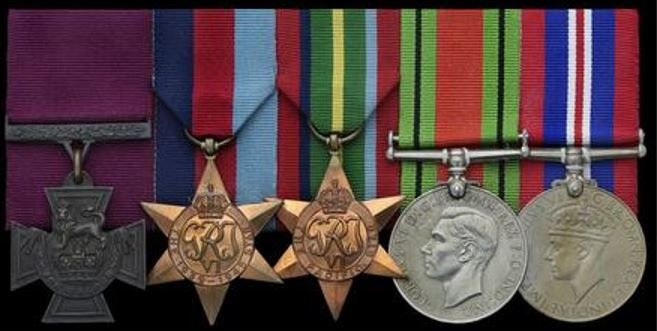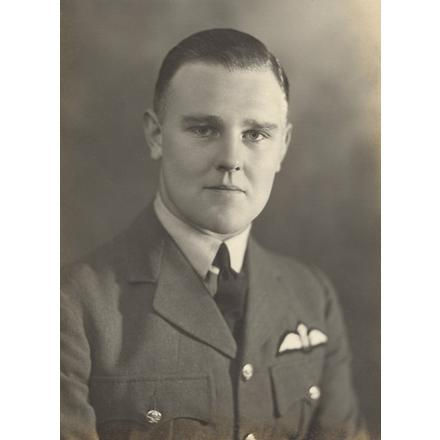The historically important and unique posthumous 'Battle of Malaya' V.C. group of five awarded to Squadron Leader A. S. K. 'Pongo' Scarf, No. 62 Squadron, Royal Air Force has been sold at auction for a cool £660,000 (incl fees).
Which is a lot.

No. 62 Squadron (a light bomber unit boasting the Bristol Blenheim) were based at Alor Star near the Thai border when it all kicked off with Japan in December 1941 and were quickly withdrawn to RAF Butterworth, situated in the city of Seberang Perai, Penang after being on the wrong end of a Japanese air-mauling.
On 8th December the Japanese launched an amphibious assault on the northern coast of Malaya at Kota Bharu and started advancing down the eastern coast of Malaya. This infantry assault benefited from substantial air support, and on 9th December 62nd Squadron quickly found themselves back inside Japanese cross-hairs as the airfield was besieged by The following day, the Japanese attacked RAF Butterworth airfield with fanatical ferocity. The order was quickly given for all available Blenheims to take to the skies - to save them from being smashed to bits on the ground but also to try and stem the Japanese invasion by attacking a key Japanese air force base just over the Thai border.
The Japanese attacks were so intense that Scarf's bomber was the only one to get off the ground. All the others were taken out of action before they could even get their wheels up.

Looking round at the mayhem and destruction, Scarf had no other option but to attempt to carry out the bombing raid on his own. With his crew, he successfully made the bombing run despite being constantly attacked but was mortally wounded on the return journey, having his left arm shattered and being wounded several times across his chest and back.
Somehow, Scarf managed to crash-land at Alor Star, and was immediately rushed to a nearby hospital. He was swiftly administered morphia and two pints of blood donated by a Nurse who was a blood match; that Nurse turned out to be his wife, whom he had only been married for a few months, she was carrying their unborn child.
Squadron Leader Scarf died whilst undergoing surgery.
His widow, Sally, had to wait four years to receive his posthumous Victoria Cross. Upon presenting the award, the King said to Mrs Scarf:
'Your late husband did a wonderful act, for which his country will be eternally grateful.'
V.C. London Gazette 21 June 1946:
'On 9th December, 1941, all available aircraft from the Royal Air Force Station, Butterworth, Malaya, were ordered to make a daylight attack on the advanced operational base of the Japanese Air Force at Singora, Thailand. From this base, the enemy fighter squadrons were supporting the landing operations.
The aircraft detailed for the sortie were on the point of taking off when the enemy made a combined dive-bombing and low level machine-gun attack on the airfield. All our aircraft were destroyed or damaged with the exception of the Blenheim piloted by Squadron Leader Scarf. This aircraft had become airborne a few seconds before the attack started.
Squadron Leader Scarf circled the airfield and witnessed the disaster. It would have been reasonable had he abandoned the projected operation which was intended to be a formation sortie. He decided, however, to press on to Singora in his single aircraft. Although he knew that this individual action could not inflict much material damage on the enemy, he, nevertheless, appreciated the moral effect which it would have on the remainder of the squadron, who were helplessly watching their aircraft burning on the ground.
Squadron Leader Scarf completed his attack successfully. The opposition over the target was severe and included attacks by a considerable number of enemy fighters. In the course of these encounters, Squadron Leader Scarf was mortally wounded.
The enemy continued to engage him in a running fight, which lasted until he had regained the Malayan border. Squadron Leader Scarf fought a brilliant evasive action in a valiant attempt to return to his base. Although he displayed the utmost gallantry and determination, he was, owing to his wounds, unable to accomplish this. He made a successful forced-landing at Alor Star without causing any injury to his crew. He was received into hospital as soon as possible, but died shortly after admission.
Squadron Leader Scarf displayed supreme heroism in the face of tremendous odds and his splendid example of self-sacrifice will long be remembered.'
Scarf was buried the following day at Alor Star. His remains were later exhumed for an official re-burial in the CWGC Taiping War Cemetery. His gravestone was additionally inscribed:
'HIS LOVE OF LIFE WAS ONLY EXCEEDED BY THE COURAGE ENCOMPASSING HIS DEATH'

Comments